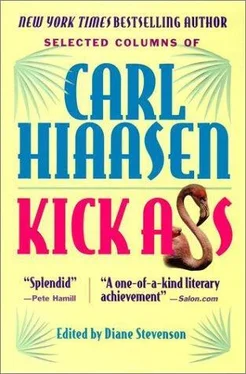Then again, maybe that's not such a great plan. You let that many politicians sit together (even at a football game), bad things are bound to happen.
The whole county could be rezoned commercial by halftime.
Lobbyists could try semaphore
May 15, 1989
A grave new crisis awaits the Metro Commission when it meets Tuesday.
Telephones.
Specifically: Should private lobbyists be allowed to call commissioners during the meeting and instruct them how to vote?
You remember four weeks ago when poor Mayor Steve Clark screwed up and voted the wrong way on a big airport construction project. No sooner had the mayor opened his mouth than his phone started to beep.
On the other end was lobbyist Eston "Dusty" Melton, the mayor's chum, ghostwriter and moral compass. Melton is to Steve Clark what Edgar Bergen was to Charlie McCarthy.
It just so happened that Melton was also a paid operative for the construction firm that stood to gain an extra $220,000 from a favorable vote on the airport project.
Apparently the mayor was reminded of this connection during the frantic phone call. He immediately arranged a new vote, absented himself (as originally planned), and the airport funding squeaked through.
Unfortunately, the mayor forgot to turn off his microphone when he took Melton's call. To complete the spectacle, a video monitor captured every moment of Clark's chagrined retreat ("Yes … No … I can't change now!")
Later the mayor said he didn't recall any of this. Then he remembered the phone call, but not who made it. Melton wisely refused to confirm or deny his half of the conversation, which probably went something like this:
"You !&*%! bozo, can't you get anything right!"
In the ensuing furor, Commissioners Joe Gersten and Larry Hawkins said lobbyists should be barred from calling during the commission meetings. Barbara Carey even ordered her phone disconnected.
And, just last week, the mayor's telephone suddenly vanished from his desk on the dais. Clark probably feared that some wise guy would publish the number (375-2400), thus inviting input from hundreds of lowly, garden-variety voters.
You might wonder why a developer's lobbyist should be able to call the mayor (375-2400) in the middle of a commission meeting, when that same privilege is not extended to the people who elected him. This is an excellent question, and the source of the commission's current agony.
To deprive lobbyists of their private touch-tone tickler is to invite mayhem. Without a phone, you can't be sure the commissioners will stick to the script. Mayor Clark is simply not as adept at memorizing his instructions as some of the others.
Tuesday's meeting requires special orchestration. On the agenda is a fancy condo project planned for smack dab in the middle of the Oleta River State Recreational Area.
The condo developers want to put in a marina. Environmental groups, joined by some county staffers, say a marina would threaten the river's population of manatees.
It promises to be a tense battle, and a controversial vote. Guess which lobbyist is pushing hard for the developers: Dusty Melton.
Now, what's Mayor Clark to do without a phone? What if he gets flustered again? What if he just plain forgets what to do? DUSTY! HELP!
The options are limited. Melton could scribble his orders on the cuffs of the mayor's shirt sleeves (a technique favored by many actors who can't remember their lines). Or maybe he could train a little parakeet to land on the mayor's shoulder and squawk in his ear before every vote.
Commissioner Charles Dusseau jokingly suggests that lobbyists bring megaphones to the meetings and holler their advice. Actually, semaphore flags would be less disruptive, or signal lights mounted in the rear of the chamber—one blink means vote "yes," two blinks mean "no," and three blinks mean, "Go home sick, we've got our quorum."
Who knows what will happen on Tuesday. The Oleta River project is a hot one, and the stakes are high.
Maybe the mayor will put back his telephone (375-2400). Maybe he'll just change the number.
Or maybe Melton and the other high-priced schemers will bring flashcards and hope for the best. There's always more than one way to reach out and clout someone.
To Dawkins, black isn't always black
March 16, 1990
Poor, confused Miller Dawkins.
Last week the Miami commissioner raised a ruckus when a man named Mario Williams was nominated for a position on the Bayfront Park Management Trust.
Williams is a black lawyer who happens to have been born in Costa Rica. Dawkins seemed unable to accept the concept. "He's a Hispanic," Dawkins said. "He's not black."
The profound ignorance of this remark would have been stunning had it come from anyone else.
The fellow who nominated Mario Williams insisted that he was indeed black, but it was to no avail. Ultimately the appointment was deferred. Meanwhile, Commissioner Dawkins has demanded a letter from Williams stating that he is, in fact, a black American.
Williams, a Harvard graduate who has lived here since the age of 10, says Dawkins is a bigot.
That might be one explanation for the commissioner's behavior. Another might be that the man is just hopelessly dim.
Dawkins (a) doesn't understand that there are black Hispanics, (b) doesn't consider black Hispanics to be black Americans, or (c) doesn't believe that a black of Hispanic heritage can fairly represent the race.
We don't know precisely what Dawkins meant because, as usual, he didn't explain himself. Assuming he was simply trying to gain a balanced representation on the Bayfront Park Management Trust, he couldn't have done so in a more degrading manner.
The panel has seats set aside for blacks, whites and Hispanics—a situation that creates obvious overlap because Hispanics can be black or white. Theoretically commissioners could challenge every Latin appointment as taking up a seat reserved for another ethnic group. At some point, common sense must be applied.
In a community where racial tensions run high, the naming leadership of Miller Dawkins has been something to behold. There was his legendary threat to burn down a Hispanic-run AIDS center if it opened in a black neighborhood.
Then, last year Dawkins pitched a fit when a white person representing the NAACP appeared before the City Commission. Dawkins seemed flabbergasted by the apparition, and refused to discuss the NAACP proposal unless the organization sent a black to the meeting.
And when a young Haitian-born lawyer was nominated to the same Bayfront Trust, Dawkins similarly questioned the color of his skin. Eventually he was satisfied that the man was black enough to deserve the job.
It would be refreshing to hear Dawkins ask about a person's education, experience or expertise. What he seems to care about most is pigmentation.
Try to imagine what kind of letter Mario Williams must write to convince Dawkins that he's qualified:
Dear Commissioner,
I know the name "Mario" is confusing, but let me assure you that I am black. Really! How black am I? Well, how black do you want—black as night? Black as tar? How black is black enough?
With all due respect, I know what I am. This morning I checked in the mirror, just to make sure.
The fact of my Latin heritage doesn't change the color of my skin, or lighten the struggle of being a black man in America. I am as wounded by racial hatred as any person, whether they were born in Overtown, Kingston or San Jose.
I'm black, commissioner. Trust me on this.
Certainly Dawkins wants to make sure that minorities are represented in all municipal endeavors—cities often need to be pushed, shamed and bullied into racial fairness.
However, in his quest Dawkins implies that some blacks are more deserving than others. Those with recent roots in Haiti, Jamaica, Nicaragua, Cuba or Puerto Rico are suspect, and must undergo scrutiny and interrogation about their true cultural identity.
Читать дальше









